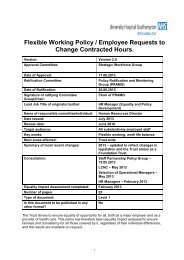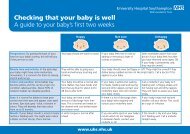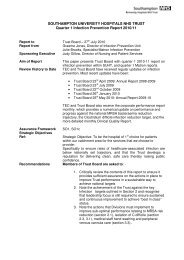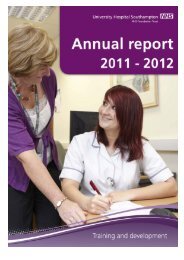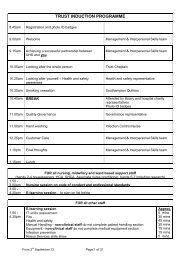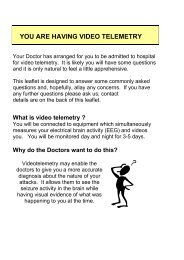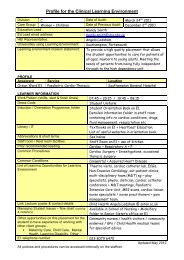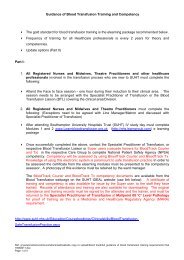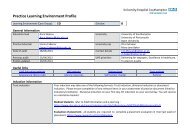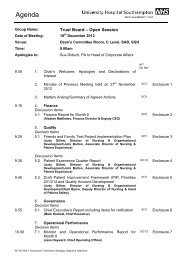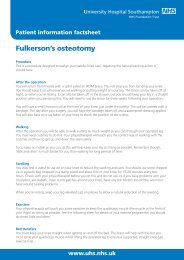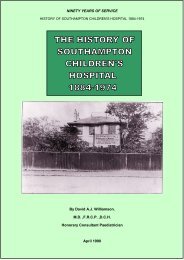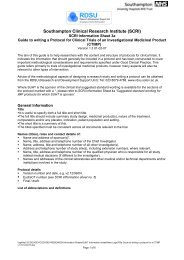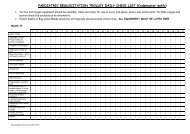Anxiety and breathing difficulties
Anxiety and breathing difficulties
Anxiety and breathing difficulties
Create successful ePaper yourself
Turn your PDF publications into a flip-book with our unique Google optimized e-Paper software.
Patient information factsheetRelaxing your <strong>breathing</strong>Some people find that their <strong>breathing</strong> becomes difficult when they are feeling anxious. Breathing techniquescan help to overcome feelings of breathlessness <strong>and</strong> manage anxiety. The tips below may be useful when your<strong>breathing</strong> becomes difficult:• If you starting to feel anxious, <strong>and</strong> you are beginning to have worrying thoughts, start by <strong>breathing</strong> out<strong>and</strong> empty your lungs as much as you can.• Breathing through your nose automatically slows your <strong>breathing</strong> down <strong>and</strong> helps to avoidhyperventilating.• Breathing into your abdomen by putting one h<strong>and</strong> on your chest <strong>and</strong> the other on your stomach. Asyou breathe in <strong>and</strong> out through your nose, the h<strong>and</strong> on your stomach should move, while the one on yourchest should keep as still as possible. By <strong>breathing</strong> into your abdomen, your diaphragm is stretched <strong>and</strong> yourelax the muscles that become tight that make it seem like it is difficult to breathe.• You could try:o Counting while you breathe, for example, by counting one <strong>and</strong> two for <strong>breathing</strong> in <strong>and</strong> three<strong>and</strong> four for <strong>breathing</strong> out. You may like to increase your counting, for example, three, four <strong>and</strong> five tobreathe out longer, to see if that helps. The counting helps to avoid rapid, panicky <strong>breathing</strong>.o Saying “re – lax” in your mind when you breathe, <strong>breathing</strong> in through your nose when saying“re” <strong>and</strong> out through your mouth when you say “lax”.For more information about <strong>breathing</strong> exercises, you can speak to the physiotherapists.Learning to relax your bodyWhen people start to feel anxious their body often starts to tense <strong>and</strong> their <strong>breathing</strong> quickens. Learningcontrolled <strong>breathing</strong> <strong>and</strong> muscle relaxation techniques can be really effective in decreasing anxiety.Relaxation involves sitting quietly <strong>and</strong> <strong>breathing</strong> slowly while relaxing the muscles in the body <strong>and</strong> clearingyour mind of all thoughts.• Here is an example of a quick relaxation technique you might like to try:1. Lie or sit down in a comfortable position, making sure your clothes are not too tight2. Try to breathe deeply <strong>and</strong> slowly, through your nose3. Starting from your toes, tighten the muscles as hard as you can <strong>and</strong> hold for a count of ten4. Relax <strong>and</strong> enjoy the feeling of release from the tension5. Spread out the muscles in your feet, hold for a count of ten <strong>and</strong> relax6. Repeat steps three to five, moving up through your body (legs, back, stomach, chest, h<strong>and</strong>s, arms,shoulders, neck, face). Tighten <strong>and</strong> relax the muscles as you go7. You may find listening to some relaxing music will help as well.• Using imagery – Some people find it useful to think about a time when they felt really good <strong>and</strong> calm.For example, it could be imagining your favourite walk or a scene which you find calming, such as a quietcountry scene, a beach or the sound of the sea. If you create a picture of this in your head <strong>and</strong> rememberall the feelings you had in your body, the smells that were around, the sounds you heard, anything youcould feel at the time <strong>and</strong> the thoughts you had it can make you feel calmer <strong>and</strong> more relaxed.You can get more information about this from the physiotherapists or psychologists. There are lots ofrelaxation tapes <strong>and</strong> books available; you can ask at your local library or bookshop.www.uhs.nhs.uk



